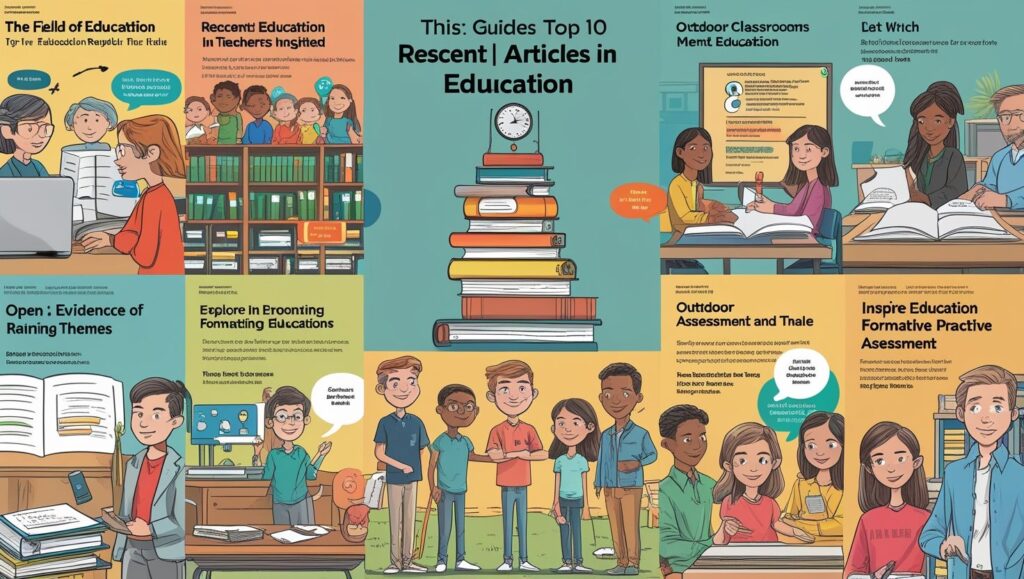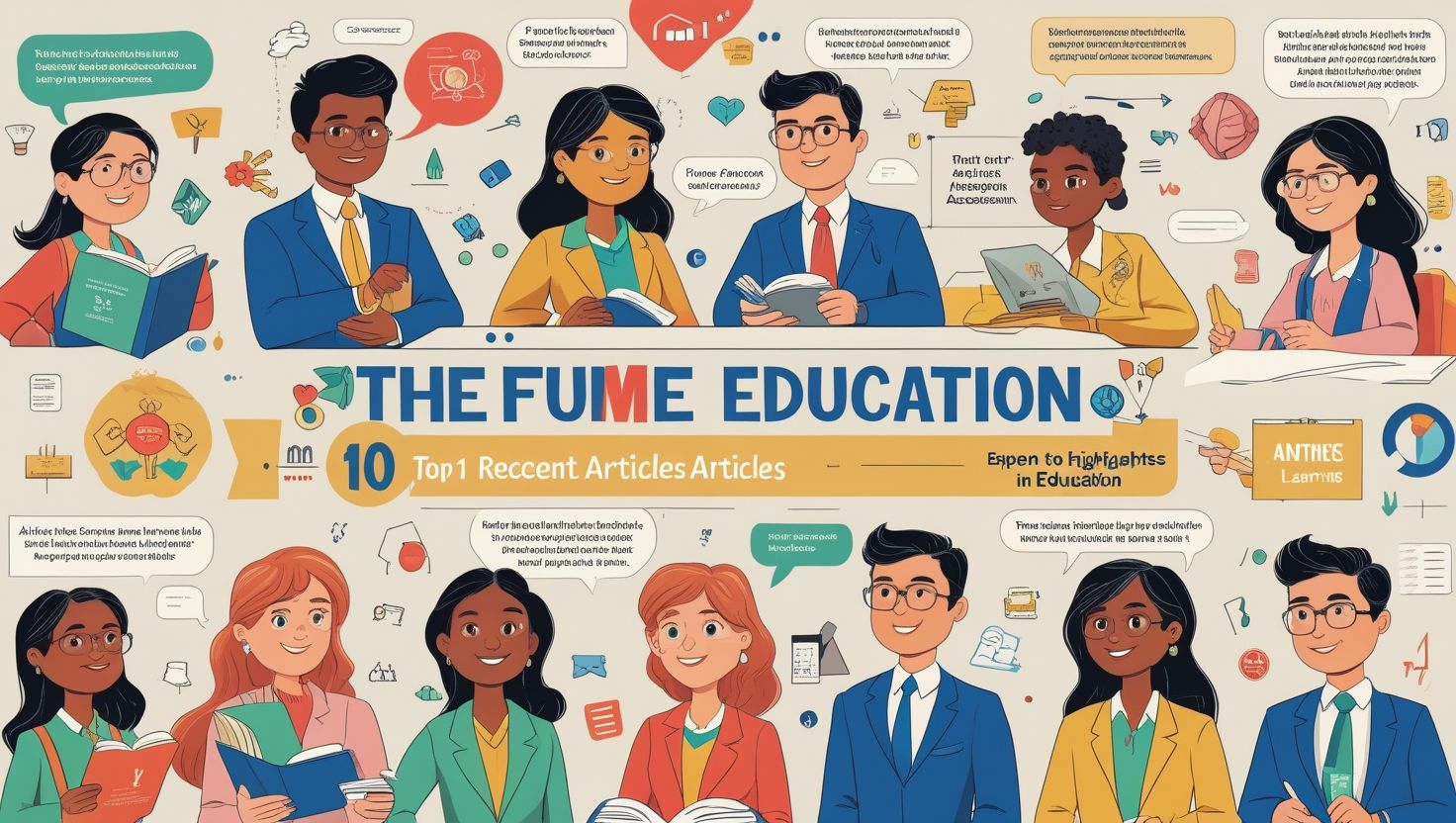1) AI-Experiments in Education: A Randomized Controlled Trial in Higher Ed (2024)
Top Ten Recent Articles in Education, Artificial intelligence is reshaping higher education. Yet, many instructors still ask whether AI helps learning in real courses. This open-access randomized controlled trial offers timely evidence. It tests AI-supported experimentation in authentic higher-ed settings. Moreover, it explores how AI can scaffold inquiry, boost feedback loops, and streamline design. Consequently, the paper is useful for departments piloting AI or generative-AI tools. It also explains data collection, assignment design, and ethical guardrails.
Additionally, the authors discuss limits, such as transferability across disciplines. Still, the design is practical and replicable. Therefore, instructional designers, ed-tech leads, and faculty learning communities can apply the templates with minimal friction. Furthermore, the PDF includes appendices with measures and procedures. Thus, it accelerates responsible AI adoption. Notably, it points to future trials that compare different AI roles, such as tutor, coach, or co-designer.
Download: https://link.springer.com/article/10.1007/s10639-024-12633-y (Open-access PDF). SpringerLink
2) Education Outside the Classroom (EOtC) RCT: Moving More, Learning Better? (2024)
Schools increasingly use outdoor or community-based learning to improve student outcomes. But does it work at scale? This randomized controlled trial evaluates the TEACHOUT EOtC model with adolescents. Importantly, it measures school-based physical activity, total weekly activity, and related outcomes. The results show a clear positive effect on physical activity during school.
However, total weekly activity does not significantly increase. Even so, the intervention demonstrates how structured EOtC can change daily routines without overhauling the timetable. Moreover, the paper provides implementable session structures, fidelity notes, and pragmatic constraints. Consequently, it helps leaders justify pilot programs while setting realistic expectations. Additionally, the open methods invite replication in different climates and cultures. Therefore, curriculum teams can adapt it to local parks, museums, and urban spaces. Ultimately, EOtC complements classroom instruction and supports well-being.
Download: https://www.nature.com/articles/s41598-024-79138-z (Open-access PDF). Nature

3) Flipped Class & Reading Comprehension: Evidence from PLOS ONE (2024)
Flipped learning continues to spread. Yet, literacy outcomes vary by design quality and learner self-management. This recent study tests a video-based pre-reading design for expository texts. Notably, it finds improved comprehension and schema acquisition overall. However, students who struggle with self-discipline can underperform if the online component is unmanaged.
Therefore, the authors recommend tight scaffolds, time-boxing, and formative checks before class. Moreover, they propose explicit strategy instruction for previewing, note-taking, and retrieval. Consequently, the study helps literacy leads tune flipped designs for equity. Additionally, because it is open access, the full instrument set is available for adaptation. Thus, departments can rapidly pilot the model, add guardrails for executive-function challenges, and monitor gains. In short, flipped reading can work—provided teachers build in structure, pacing, and consistent feedback.
Download: HTML https://journals.plos.org/plosone/article?id=10.1371/journal.pone.0305041 | PDF https://journals.plos.org/plosone/article/file?id=10.1371%2Fjournal.pone.0305041&type=printable . PLOS+1
4) Mental-Health Literacy Curriculum RCT for Secondary Students (2025)
Student well-being links tightly to attendance, engagement, and achievement. Nevertheless, many schools lack an evidence-based mental-health curriculum. This randomized controlled trial evaluates a six-module program covering mental health/illness, stigma, support-seeking, and positive practices. The design integrates teacher training plus a ten-session classroom sequence. Moreover, the primary outcome uses the validated SWEMWBS scale, which strengthens inferences. Consequently, leaders can use this as a template for Tier 1 prevention.
Additionally, the paper details module flow, dosage, and timelines that fit standard terms. However, implementation fidelity still matters; the authors note training and ongoing coaching issues. Even so, the results support scaling mental-health literacy as part of a whole-school strategy. Therefore, districts can align this with SEL frameworks, counseling services, and parent workshops.
Download: https://www.nature.com/articles/s41598-025-08074-3 (Open-access HTML/PDF). Nature
5) Learning Analytics in Immersive Virtual Learning Environments: Systematic Review (2025)
Immersive VR/AR learning is moving from novelty to strategy. Yet, analytics in immersive spaces remain fragmented. This PRISMA-guided review synthesizes applications of learning analytics in immersive VLEs, highlighting multimodal data (e.g., gaze, gesture, speech), methodological gaps, and promising indicators of engagement and transfer.
Moreover, it maps tools, pipelines, and ethics considerations. Consequently, the article is a roadmap for universities and K-12 innovation units planning mixed-reality labs. Additionally, it spotlights interoperability issues and the need for dashboards that support teacher decision-making in real time. Therefore, developers can prioritize features that translate analytics into actionable feedback. Furthermore, the authors call for equity-centered design to prevent bias in multimodal models. Thus, the paper balances excitement with rigor. It also curates a useful reference list for grant proposals and pilots.
Download: https://slejournal.springeropen.com/articles/10.1186/s40561-025-00381-6 (Open-access PDF). SpringerOpen

6) Highly Informative Feedback with Learning Analytics in Higher Education (2025)
Personalized feedback drives learning. However, it is costly at scale. This open-access article surveys how learning analytics and AI can automate formative feedback while keeping learners at the center. Importantly, the paper emphasizes “feedback literacy,” not just feedback delivery. Moreover, it describes architectures that blend predictive models with student-facing explanations and metacognitive prompts. Consequently, instructors gain a blueprint for timely, actionable comments that students can actually use.
Additionally, the authors discuss governance: privacy, transparency, and consent. Therefore, leaders can pair technical rollouts with policy and professional learning. Furthermore, example workflows show how to close the loop so students respond, revise, and reflect. Thus, the study pushes beyond scoring to sustainable improvement. Notably, it flags research needs around fairness and long-term effects.
Download: https://educationaltechnologyjournal.springeropen.com/articles/10.1186/s41239-025-00539-9 (Open-access PDF). SpringerOpen
7) Formative Assessment in K-12: Systematic Review of Meta-Analyses (2024)
Formative assessment remains one of the most powerful levers for achievement. Still, implementation quality varies. This open-access study synthesizes meta-analyses on K-12 formative assessment, clarifying where effects are strongest and which practices travel well. Moreover, it frames formative work as a pathway to sustainable quality education. Consequently, the paper helps teams prioritize strategies with the best evidence-to-effort ratio—think learning intentions, success criteria, feedback cycles, and student self-assessment.
Additionally, the authors flag research gaps and context modifiers (e.g., subject, age, duration). Therefore, schools can differentiate PD and avoid one-size-fits-all toolkits. Furthermore, the review’s tables and effect-size summaries make it easy to brief stakeholders. Thus, it is perfect for evidence-informed improvement plans or grant narratives.
Download: https://www.mdpi.com/2071-1050/16/17/7826 (Open-access HTML/PDF). MDPI
8) Problem-Based Learning for EFL: PRISMA Systematic Review & Meta-Analysis (2024/2025)
English language learning increasingly integrates problem-based learning (PBL). But how large are the gains? This PRISMA-guided meta-analysis synthesizes 27 studies (2012–2023), finding positive effects on language proficiency, critical thinking, and student behavior. Moreover, it identifies moderators such as task authenticity, scaffolding, and assessment design.
Consequently, EFL coordinators can refine PBL units by tightening prompts, modeling teamwork moves, and aligning rubrics with outcomes. Additionally, the article surfaces challenges—uneven implementation, time demands, and teacher readiness. Therefore, it recommends staged rollouts, coaching, and ready-to-use project frames. Furthermore, because it is open access, teams can reuse extraction matrices to audit their own curricula. Thus, it bridges research and classroom practice.
Download: https://journals.plos.org/plosone/article?id=10.1371/journal.pone.0307819 (Open-access HTML/PDF). PLOS
9) Transition of Under-3s from Home to Early Childhood Education & Care: Scoping Review (2025)

Transitions shape lifelong attitudes toward schooling. Nevertheless, research on children under three often sits in separate silos. This open-access scoping review maps global evidence about moving under-3-year-olds from home to ECEC settings. Moreover, it surfaces what matters: attachment-sensitive onboarding, family partnerships, small-group routines, and consistent adult relationships. Consequently, the article offers leaders a comprehensive checklist for transition policies, room setup, staggered starts, and caregiver communication.
Additionally, it highlights research gaps in non-Western contexts and with marginalized families. Therefore, ministries, NGOs, and ECEC networks can target funding to culturally responsive approaches. Furthermore, the review’s framework helps programs monitor stress signals while sustaining play-based pedagogy. Thus, it balances care, curriculum, and equity from day one.
Download: https://www.mdpi.com/2227-7102/15/5/589 (Open-access HTML/PDF). MDPI
10) SEL, Oxytocin, and Empathy: RCT Evidence from Adolescents (2025)
Social-emotional learning is expanding, yet biological and behavioral mechanisms are still emerging. This randomized trial tracks adolescents across a one-week SEL intervention. Notably, a group-bonding task significantly increases salivary oxytocin. However, the week-long program does not further augment this increase. Even so, empathy measures improve, suggesting nuanced pathways.
Moreover, the study underscores dosage, activity type, and context as critical levers. Consequently, schools might blend short, high-bond tasks into advisory periods, while iterating on longer curricula. Additionally, the paper models transparent reporting and ethical handling of biomarkers in school-adjacent research. Therefore, it invites partnerships between educators, psychologists, and health researchers. Furthermore, because the article is open access, teams can reuse procedures and consent language. Thus, it accelerates safe, evidence-based SEL design.
Download: https://www.nature.com/articles/s41599-025-04893-x (Open-access HTML/PDF). Nature
Brief Introduction (for SEO)
Education is evolving quickly. Therefore, leaders need credible, recent, and open-access research they can actually use. The ten articles above span AI, feedback, formative assessment, SEL, ECEC transitions, immersive learning, and outdoor education. Moreover, every item includes a direct download link. Consequently, you can read, pilot, and share with colleagues today. Additionally, the collection balances rigorous designs (e.g., RCTs, PRISMA reviews) with practical classroom guidance. Thus, it is ideal for school improvement plans, PD workshops, strategic proposals, and graduate seminars.
Quick How-To Use This List
- Start with #7 for district-wide formative assessment PD.
- Pair #6 with #5 to scale analytics-informed feedback in hybrid and immersive courses.
- Combine #2 and #4 for well-being plus movement across the timetable.
- Use #3 and #8 to refresh literacy and EFL units with evidence-based designs.
- Apply #9 to strengthen family partnerships and gentle transitions in ECEC.
References (5)
- AI-Experiments in Education: RCT in Higher Ed (2024). Education and Information Technologies. https://link.springer.com/article/10.1007/s10639-024-12633-y . SpringerLink
- Learning Analytics in Immersive VLEs: Systematic Review (2025). Smart Learning Environments. https://slejournal.springeropen.com/articles/10.1186/s40561-025-00381-6 . SpringerOpen
- Formative Assessment in K-12: Systematic Review of Meta-Analyses (2024). Sustainability. https://www.mdpi.com/2071-1050/16/17/7826 . MDPI
- Mental-Health Literacy Curriculum RCT (2025). Scientific Reports. https://www.nature.com/articles/s41598-025-08074-3 . Nature
- Flipped Class & Reading Comprehension (2024). PLOS ONE. https://journals.plos.org/plosone/article?id=10.1371/journal.pone.0305041

This article came at the perfect time for me.
Such a thoughtful and well-researched piece. Thank you.
Very relevant and timely content. Appreciate you sharing this.
What i dont understood is in reality how youre now not really a lot more smartlyfavored than you might be now Youre very intelligent You understand therefore significantly in terms of this topic produced me personally believe it from a lot of numerous angles Its like women and men are not interested except it is one thing to accomplish with Woman gaga Your own stuffs outstanding Always care for it up
I never thought about it that way before. Great insight!
Keep educating and inspiring others with posts like this.
This was really well done. I can tell a lot of thought went into making it clear and user-friendly. Keep up the good work!
This helped clarify a lot of questions I had.
I was suggested this web site by my cousin Im not sure whether this post is written by him as no one else know such detailed about my trouble You are incredible Thanks
I agree with your point of view and found this very insightful.
This article came at the perfect time for me.
Great points, well supported by facts and logic.
This gave me a lot to think about. Thanks for sharing.
This content is really helpful, especially for beginners like me.
You’ve clearly done your research, and it shows.
you are truly a just right webmaster The site loading speed is incredible It kind of feels that youre doing any distinctive trick In addition The contents are masterwork you have done a great activity in this matter
Thank you for sharing such a well-structured and easy-to-digest post. It’s not always easy to find content that strikes the right balance between informative and engaging, but this piece really delivered. I appreciated how each section built on the last without overwhelming the reader. Even though I’ve come across similar topics before, the way you presented the information here made it more approachable. I’ll definitely be returning to this as a reference point. It’s the kind of post that’s genuinely helpful no matter your level of experience with the subject. Looking forward to reading more of your work—keep it up! profis-vor-ort.de
Your writing is not only informative but also incredibly inspiring. You have a knack for sparking curiosity and encouraging critical thinking. Thank you for being such a positive influence!
Istanbul Old City tour Perfect introduction to the city for first-time visitors. https://seminarkitmurah.com/?p=39105
wjvaab
all new zealandn casino, united states casino online how to play free fire and earn money (Manie) new casino site uk 2021, or safe online casino australia
australia hinckley mn casino bingo (Dawn) online state
united, online gambling ads uk and casinos
in saskatchewan united states, or 888 poker deposit new zealand
online pokies gambling australia, no deposit casinos for usa and new online
casinos with no deposit bonus codes (Freya) no deposit bonus casino uk,
or free 50 pokies canada
tipps für sportwetten heute
Have a look at my page: esc Wetten schweiz
esc wettquoten deutschland
Here is my web-site: bester bonus sportwetten (Princess)
geld zurück online sportwetten (Wp-Test.Diwiton.net) vorhersage app
quote wetten dass gestern
My blog … Wettanbieter curacao
wetten mit bonus
Here is my blog post – besten wettanbieter
wetten dass heute gäste
Here is my page … sportwetten Vorhersagen App
esports wetten deutschland verboten – Wilton,
ergebnisse vorhersage
sportwetten neukundenbonus ohne einzahlung
my web site; Wetten Und Gewinnen
© casinoohneverifizierung.net Alle Rechte vorbehalten 2025 Sollten Sie zudem mit Kryptowährungen spielen, gibt es keine Barrieren mehr für den uneingeschränkten und anonymen Spielspaß in Online-Casinos ohne Verifizierung.
Am einfachsten ist es, anonym mit Bitcoin in Casinos ohne Verifizierung anonym zu spielen. Es macht einfach mehr Spaß, mit professionellen Dealern und Croupiers
zu spielen oder an Live Gameshows teilzunehmen.
Als ein von der GGL lizenzierter Automatenspieleanbieter mit Sofortauszahlung bietet StarGames außerdem höchste Sicherheit beim Zahlungsverkehr.
Als neuer Spieler erhalten Sie einen Willkommensbonus von bis zu 1.750
€ sowie 50 Freispielen. Casinos ohne Anmeldung bieten eine schnelle und unkomplizierte Möglichkeit,
online zu spielen.
Sie kaufen die Paysafecard online oder im stationären Handel im gewünschten Gegenwert, erhalten eine PIN und müssen diese PIN
im Rahmen des Zahlungsprozesses im Casino ohne KYC eingeben. Die Zahlungsmethoden spielen in Online Casinos ohne
Verifizierung eine wichtige Rolle. Der Willkommensbonus bringt bis zu 500 € und bis zu 200 Freispiele.
Der Willkommensbonus für neue Kunden bringt 100 % bis zu 500
€ + 200 Freispiele. Ein Casino ohne Verifizierung
ist ein Anbieter, bei dem Sie schnell spielen und auch Zahlungen vornehmen können, ohne
zuvor den mitunter aufwendigen Schritt der Verifizierung gehen zu müssen.
References:
https://online-spielhallen.de/playfina-casino-bewertung-ein-detaillierter-spielbericht/
海外华人必备的ifun官方认证平台,24小时不间断提供最新高清电影、电视剧,无广告观看体验。